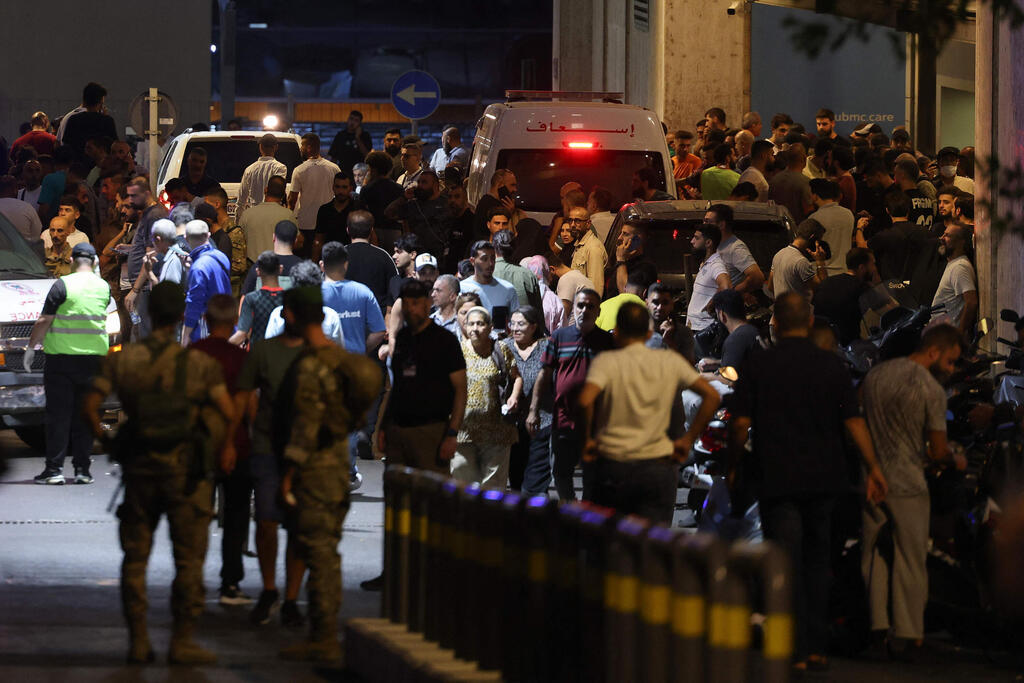Getting your Trinity Audio player ready...
Israel’s 2024 population comprised 0.12% of the world’s population. Its territory amounts to 88% of Maryland’s. And yet on September 17 and 18, this tiny nation most likely caused armies the world over to rethink their military doctrines. This was a full-blown remote-controlled offensive deep inside enemy territory that inflicted mass casualties but without risking a single soldier in face-to-face combat and with traditional military capabilities absent from the battlefield.
In a complex, multistage attack, Israel caused thousands of Hezbollah pagers and handheld radios, the latter popularly known as walkie-talkies, to explode on command across Lebanon and reportedly also among personnel of Iran’s Islamic Revolutionary Guard Corps (IRGC) stationed in Syria.
According to the Lebanese Health Minister Dr. Firass Abiad, 608 have been wounded and 25 killed in the walkie-talkie explosions. These numbers are in addition to the over 3,000 Hezbollah “operatives“ injured in the pager blasts. Hezbollah admitted that 37 “shahids on their way to Al-Quds [Jerusalem]” were “martyred” in the attacks, but Israel assesses that the official estimate of the dead and wounded in Lebanon is significantly lower than the real figure.
Hezbollah’s General Secretary Hassan Nasrallah admitted as much when he stated, in a speech on September 19, that: “There is no doubt that we have suffered a major security and humanitarian blow, unprecedented in the history of mankind and perhaps in the history of the conflict. We have received a heavy blow… We understand that the enemy has technological superiority….”
Likewise, AFP on September 19 cited Lebanese Prime Minister Najib Mikati as demanding that the UN Security Council "instruct Israel to stop the technological war".
As the Washington Post put it on September 21, “In one move, Israel demonstrated not only that it had penetrated Hezbollah’s communications systems, but that it could turn those very devices against its enemy, killing or sidelining its member.” (On top of it, the Israeli covert operation had Hezbollah purchase the devices and thus finance at least part of the activities against it!)
But the groundbreaking and flawlessly executed operation entails other potentially momentous strategic implications:
First, the new capability certainly qualifies as a Weapon of Mass Destruction (WMD). The editor of the Hezbollah mouthpiece, the Lebanese Al-Akhbar newspaper, Ibrahim Al-Amin, in an article on September 19, clearly agreed. He titled his piece: "The war of annihilation in its Lebanese version - Israel wants to eliminate Hezbollah."
The precision of the weapon combined with its potentially clandestine nature would make the new capability pass muster as a first-strike weapon
Yet, unlike the traditional nuclear, biological, and chemical (NBC) weapons, the Israeli version can be employed surgically. One Israeli commentator even described the attacks as “the largest and most lethal targeted-killing operation in history.”
Israel’s Channel 12 in a lengthy report on September 21 even claimed each of the pagers that exploded on their Hezbollah owners across Lebanon “was individually detonated, with the attackers knowing who was being targeted, where he was, and whether others were nearby” to limit collateral damage.
Second, operators of the new WMD could do so surreptitiously and stay hidden. Even Nasrallah noticed it. In his televised address following the two attacks, he stated “This battle was carried out by invisible faces.” But, unlike biological or some chemical agents whose impact is delayed and helps the user to maintain secrecy, the new Israeli WMD acts instantly upon activation. The precision of the weapon combined with its potentially clandestine nature would make the new capability pass muster as a first-strike weapon.
The new WMD thus means that Israel in effect has augmented its “bomb in the basement” nuclear posture, designed for a last resort scenario, with a “bomb in your pocket” one designed as a weapon of first resort.
Indeed, while NBC weapons render the areas they are targeted against hazardous and accessible, at least temporarily, the new aMD acts oppositely In actuality it may be unreasonable to use it to deliver a first strike unless it is an opening shot of a larger campaign, one perhaps involving a ground offensive, which follows immediately on its heels.
As the new WMD is simply unlikely to decide the conflict by itself, the gains from its deployment would be most effective as an opening salvo in a broader war by incapacitating key operatives and disrupting communications while fomenting internal chaos.
Third, unlike traditional NBC weapons which oftentimes require special storage sites like silos and “ safe zones,” the new WMD is stored inside its “host”—i.e. the receptor for its remote signal—in the target area itself. The WMD could remain dormant until activation and as the “host” could be an innocuous, widely-used gadget discovery of its weaponization becomes difficult. In effect, the new capability could be considered an in-waiting mass destruction stealth weapon.
Fourth, the employment of biological and chemical (BC) mass destruction weapons entails significant psychological consequences. However, their impact differs from the new remote-controlled WMD as the latter’s strategic import may be primarily psychological. In comparison, the main outcome of unleashing BC weapons would likely be the infliction of large-scale physical harm.
Writing in the Atlantic Magazine on September 18, Graeme Wood commented on the beepers attack as follows: ”A certain type of spy operation is known as a ‘hand of God,’ because to its victims it seems to come with such sudden and precise violence that it may as well have been a thunderbolt…Everyone presumes that mortals in Israel are responsible for Pager-geddon, but the aura of divine wrath is the same, except here multiplied by a factor of a thousand or more.”
Two days later AP reported from Beirut “In the aftermath of the exploding pagers, fear and paranoia has taken hold. Parents kept their children away from schools and universities, fearing more exploding devices. Organizations including the Lebanese civil defense advised personnel to switch off their devices and remove all batteries until further notice. One woman said she disconnected her baby monitor and other household appliances.”
Srulik Einhorn brilliantly summed up the psychological aftermath of the new weapon when he wrote in the Jerusalem Post on September 19: “They [Hezbollah terrorists] will no longer view a refrigerator, microwave, or light bulb in the same way. Until their last day, they will never feel safe, no matter where they are. They will live in constant fear of what might explode next…While they glorify death in battle, they are not prepared for this type of psychological warfare—one that targets their everyday life, creating fear where they least expect it. They sense Israel’s superiority and their inability to counter it…To truly defeat terrorists, one must dismantle their mental defenses and make them feel powerless…Hezbollah may produce disciplined extremists motivated by religious ideology, but they lack the sophistication, creativity, and daring that define the world’s true innovators. This is why Israeli actions are so significant: they represent the superiority of Western culture over religious fanaticism.”
The bottom line, the London Guardian reported on September 21, “the sudden, brutal nature of the [remote] attacks shattered whatever sense of safety the Lebanese people felt.”
Fifth, the revolutionary nature of the new capability becomes apparent given its widespread possibly global reach. For example, the Washington Post reported on September 22, that “Israel’s apparent [ability to ] penetrate [Hezbollah’s] low-tech communications network, has also sent ripples of fear through Iran’s web of armed groups in the region, including in Syria, Iraq, Yemen, and the Palestinian territories.”
The Dubai-based Al-Arabiya satellite television channel reported Iran has sent a delegation to Beirut to “investigate the detonation of communications equipment in Lebanon.” Subsequently, Reuters on September 23 cited “ two senior Iranian security officials” Sept 23 as disclosing that Iran's IRGC has ordered all its members to “stop using any type of communication devices.”
Sixth, as with the other NBC capabilities the risk of the technology proliferating and over time reaching the hands of some of Israel’s enemies must be considered. Indeed this is a risk that is present any time a new capability is used publicly. For example, Iran, Hezbollah, and Hamas have used Israel's once dominance in drone technology to come up with their versions through reverse engineering of Israeli and American models.
In the case of the new WMD, the innovation was perhaps not technological, so much as a feat of ingenious and creative covert operation. It suggests that a country or group with the appropriate resources and patience could replicate Israel’s handiwork and convert ordinary devices into weapons thus acquiring a “poor man’s WMD.”
However, the incorporation of the new WMD as one of the options available for regular use faces a major impediment. It requires the setting of an elaborate infrastructure inside the enemy’s territory to be deployable. This is a major obstacle but in the hands of a commanding intelligence service, not an unsurmountable one, which is absent from deploying traditional WMD. Nuclear, chemical, or biological weapons are readily available in the arsenals of certain countries and can be used on short notice. The new WMD requires a lengthy period of preparation and insertion of (armed) electronic devices into the target state or organization—an operation that could be discovered and thwarted by the enemy’s counterintelligence apparatuses.
As it happened an “American intelligence source” reportedly told ABC News the pagers’ operation in Lebanon was planned by Israel for at least 15 years and included the establishment of shell companies and infiltration of the supply chain.
After the initial use of the new WMD countermeasures can be quickly taken to curtail its impact for example by simply discarding the tampered devices
The extended lead time was also confirmed indirectly by “Israeli officials” who reportedly told the Washington Post on September 22, that “blowing up the radios” in Lebanon was part of Israel's effort over the past decade to develop the "red button" - a potentially devastating intrusion for the other side, which could lie dormant for months if not years before being triggered.
Moreover, after the initial use of the new WMD countermeasures can be quickly taken to curtail its impact for example by simply discarding the tampered devices. Such action, although it might be urgently necessary, such action is not without cost and could impair the enemy’s command and control systems.
Some analysts, not without a political agenda, have dismissed the strategic significance of the remote war option claiming that operations of such breadth and depth are intended to be a weapon of ultimate surprise, which can be used a single time only. Once it is used, the methodology is exposed and a precious intelligence asset is burnt. Therefore, it was claimed, in the absence of any military offensive follow-up the timing of the “wasteful” deployment of this precious capability was entirely motivated by Prime Minister Benjamin Netanyahu’s political considerations.
While these cautionary remarks may have some validity, it would be a mistake to assume that the same creativity and ingenuity responsible for the new WMD becoming operational in mid-September 2024 will somehow dry out in the future.
History proves otherwise
Hezbollah has been fighting for years to prevent the hacking of its communications networks. In the past, the Shi'ite militia group has reported arrests of communications and cyber-technology experts who were suspected of working directly or indirectly for Israel and also reported the discovery of camouflaged eavesdropping devices in Lebanon.
Last February Nasrallah warned his terrorists of the danger: ”Israel doesn't need agents and collaborators because every cellular phone is a particularly lethal agent. It gives Israel all the information, even locations at home or on the street or in a car and whether you're sitting in the front seat or the back."
It should not be forgotten that it was this concern over Israel’s ability to track and hack into its cell phones that forced Hezbollah to adopt pagers in the first place.
Moreover, Israel has turned personal communications equipment into weapons before, notably in 1996 when it killed Hamas’s chief bombmaker Yahya Ayyash with explosives hidden inside a cellphone. Reuters on September 20 cited “ [A Lebanese security] source familiar with the exploding pagers” as disclosing that Hezbollah had foiled previous Israeli operations targeting devices imported from abroad by the group - from its private landline telephones to ventilation units in the group's offices.
Also, it is important to note that the remote technology itself is readily available and potentially applicable to other commonly used electronic devices. This is in stark contrast to the other NBC technology which may take years to develop and has no other household uses. By comparison, defending against future attacks of the new WMD must be a nightmarish task given the possible use of household electronics connected to the Internet of Things as launching pads.
Whatever the actual or presumed limitations of the new WMD, the technological and operational breakthroughs that transformed cyber into kinetic warfare are sure to rekindle the debate over the future battlefield. The argument between quality and quantity in deciding the characteristics of a future military force is bound to resurface. This is especially in light of the geopolitical gains made by Iran’s proxy strategy while all the time relying mostly on huge quantities of low-tech, even primitive, weapons and a seemingly unending supply of “martyrs”.
An arms race to achieve supremacy in the new technological war is certainly in the offing
As for the impact on the current conflict, it may be pointed out that tactically Israel’s ability to penetrate so thoroughly Hezbollah’s communications will likely hamper its ability to use electronic devices to communicate. They will be forced to conduct face-to-face meetings which will make them more vulnerable. The targeted killing of Hezbollah’s head of the Operations Division and commander of its Radwan force Ibrahim Aqil may already be ascribed to the remote attack. The international news television network France 24 reported on September 20 that Aqil had “just come out of the hospital this morning [after] he had been wounded by his pager.” He and 15 other top Hezbollah commanders, including the “ entire senior command “of the Radwan force, were meeting in a Beirut hideout when they were taken out in a targeted strike by the Israeli Air Force.
Strategically, the Channel 12 report claimed t it t was regarded as “preferable” that the large number of Hezbollah fighters whose devices exploded be badly injured rather than killed, in part because of the immense strain this placed on health services in Lebanon, and by extension the raised domestic pressure on Hezbollah.
Israel is now perceived as a country with perhaps mythical powers, and the ensuing uncertainty and speculation as to what else might be in store for its enemies is a decisive strategic force multiplier.
More importantly, the deployment of the new Israeli WMD adds to a chain of spectacular Israeli attacks which cumulatively have turned the “balance of fear” in Israel’s favor after the October 7 catastrophe. The introduction of the new capability ignited imaginations all over,r particularly in the Middle East where fantastic thinking and exaggerations are common. (Already, according to Arab media, a member of the Security Committee of the Iranian Shura Council, Ahmad Bahshaish Ardestani, disclosed that the “explosion of the pager devices was one of the scenarios [examined] for the possible killing of [Iranian President] Ibrahim Raisi [whose helicopter crashed last May.])”
Israel is now perceived as a country with perhaps mythical powers, and the ensuing uncertainty and speculation as to what else might be in store for its enemies is a decisive strategic force multiplier. (In a statement released September 24, Hezbollah’s media department said Israeli planes have dropped leaflets in the Bekaa Valley. It said “Please do not open or share the QR codes; they should be disposed of immediately as they are very dangerous. This code can extract all the information on your devices and poses a threat to your safety. We urge everyone to exercise caution.”)
In the wake of the Israeli show of deadly technological wizardry, Islamists vow to destroy Israel, as Iran’s Ayatollah Khameini had just urged, which sounds even more hollow than before. In contrast, the self-confidence and morale of Israelis have received a material boost. It may be even argued, that Hezbollah’s senseless and counterproductive aggression paradoxically provides Israel with successive opportunities to demonstrate its unequaled superiority over its enemies.
No wonder the Iranian embassy in Beirut complained that “Israel’s madness has crossed all borders.” On September 22, the same embassy published a post on the X network, in which it wrote that "Israel does not deserve any type of technology. Criminals whose access to the beeper cannot be trusted must not be allowed to possess nuclear weapons. Israel must be disarmed now. Tomorrow will be too late."
Dr. Avigdor Haselkorn is a strategic analyst. He has been published widely on national security issues.




